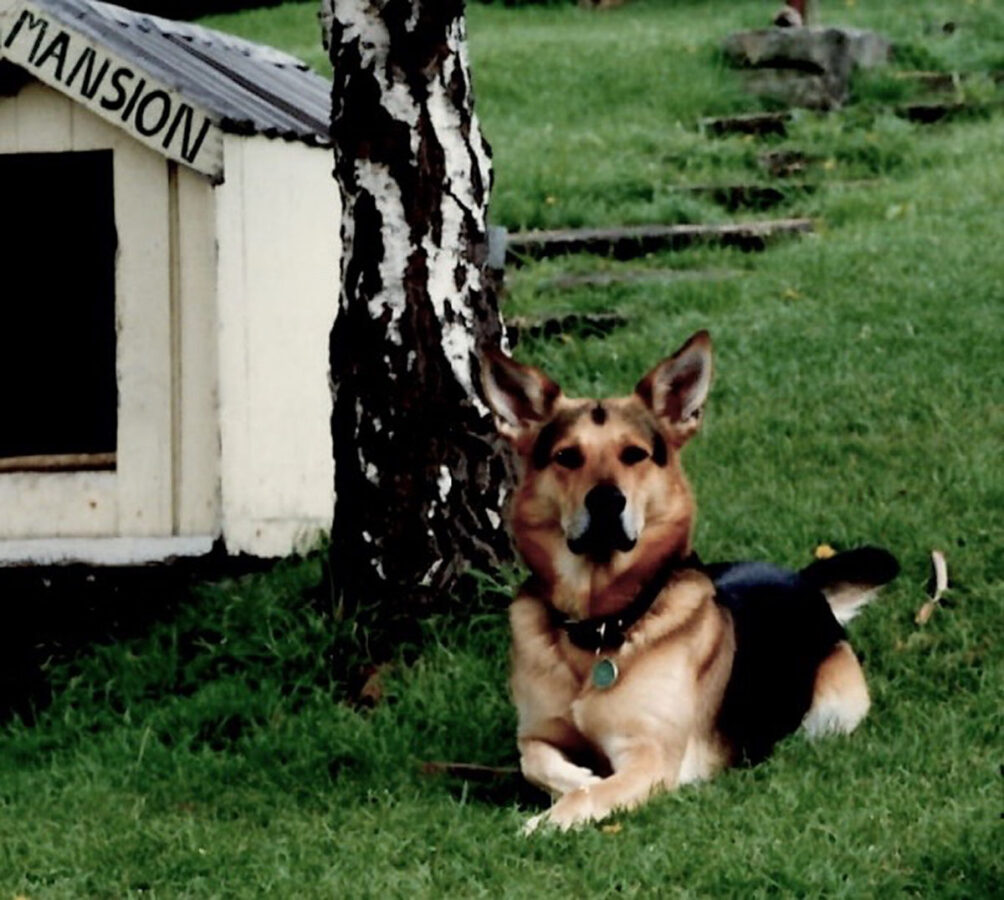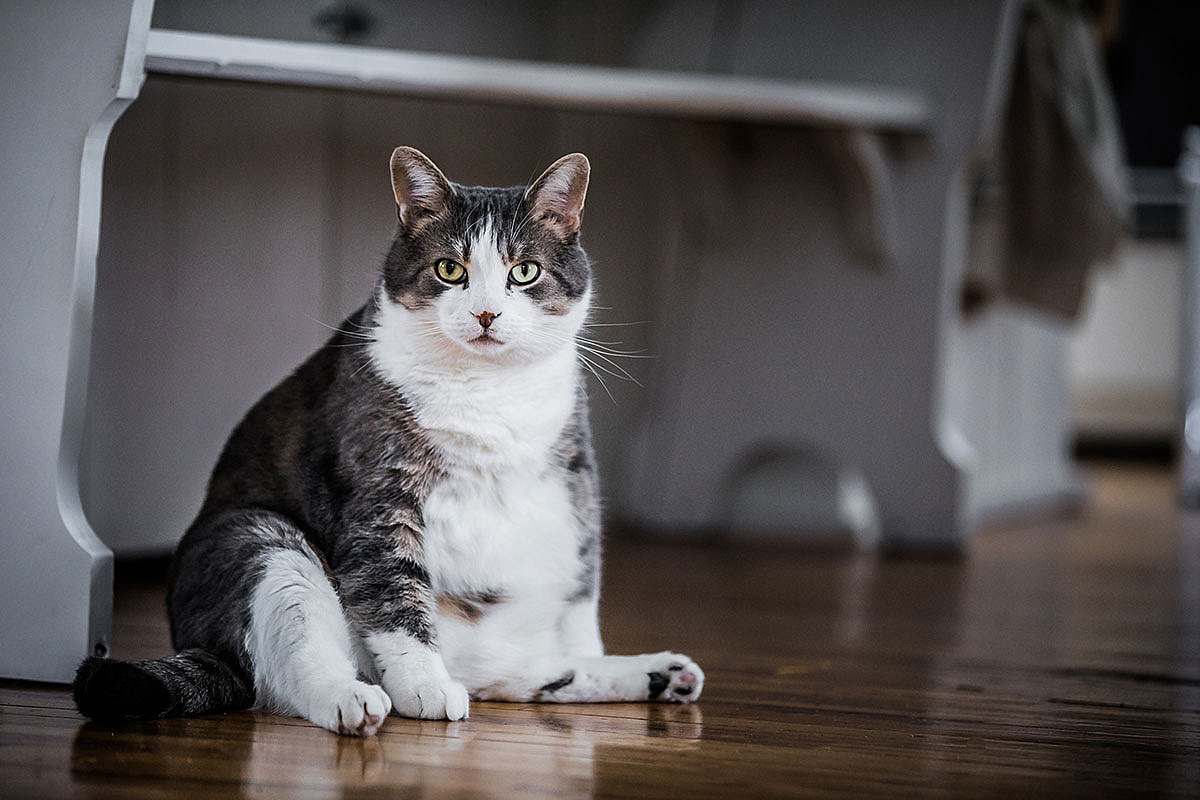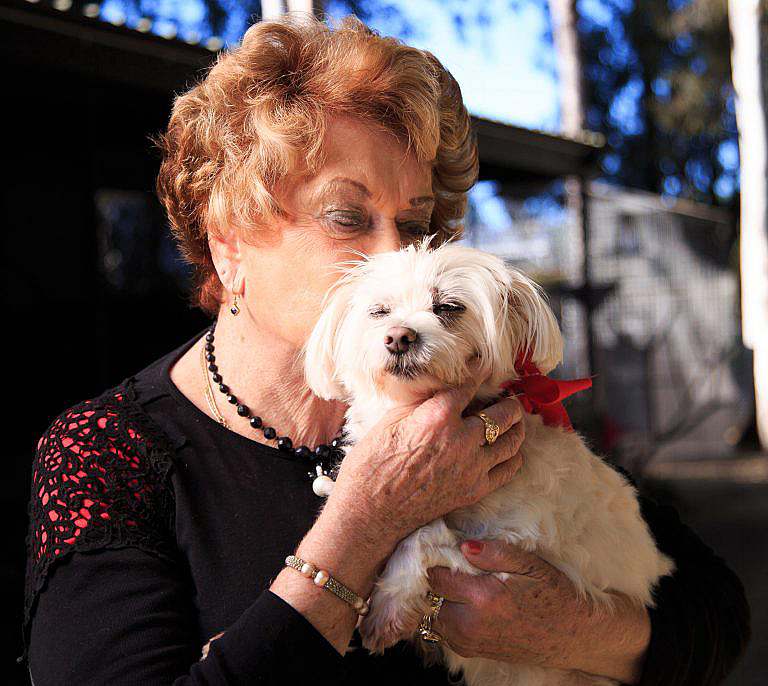Let’s face it the cost of living means we often have to sacrifice square meterage for a simple roof. You might have to let go of your three-seater sofa or the dream of a grassy backyard, but there’s one thing you shouldn’t have to sacrifice – your dog.
It’s commonly believed that you can’t keep big dogs in small apartments, but the truth is, when it comes to housing for your big boy (or girl), size doesn’t always matter.
So, what does matter? Sydney Dogs & Cats Home Team Leader Hannah Turner tells us there are a number of other factors you need to consider when deciding on a dog’s living arrangements. These include:
- the dog’s temperament
- opportunities for exercise
- your ability to maintain a routine
- the landlord or apartment rules.
Temperament
The specific needs of your dog are often dependent his/her temperament. A puppy full of energy and a belly full of barks isn’t going to fare as well in an apartment as an elderly greyhound who likes to nap. When deciding whether a dog can live in a small apartment, consider:
- the dog’s tendency to bark. If the barks for long periods of time, consider whether you can train them to minimise barking. Loud dogs tend to irritate neighbours, and may encourage a complaint.
- the dog’s energy levels. Energy levels vary from dog to dog. This can be impacted by the dog’s age, health, breed and more. In an apartment, you ideally need a dog who is happy to rest or nap quietly when you’re not available. Dog’s high in energy may become destructive when left alone or become unfit and/or stressed in small spaces.
- the dog’s attitude towards other dogs and people. If you run into a neighbour or another dog in the hall, is your dog going to stay calm? Is it going to be friendly? Your neighbours may have allergies, or may not like interacting with dogs. Similarly, your dog needs to be friendly with other dogs, so everyone in your apartment building feels safe.
Exercise
Even the laziest of dogs needs exercise to stay happy and healthy. The amount of exercise a dog needs will depend on its age, health and individual preference. We recommend talking to your vet to get advice tailored to your dog. Once you have this information, ask yourself – can I commit to providing enough exercise every day?
Exercise doesn’t always mean you need to take your dog on a set number of walks each day. While your dog should walk regularly, there are other ways to exercise them throughout the day. These include:
- swimming
- playing fetch up and down the stairs
- a home-made obstacle course
- hide and seek (with treats)
- tug of war
- toys such as puzzles and kongs
- training new skills or tricks such as fetching household objects or tidying up their toys.
If you can’t commit to providing enough exercise, you can consider hiring a dog walker or taking them to a doggie daycare.
Routine
Routine can make life a lot easier for a dog, especially in an apartment. If you’re considering keeping a big dog in a small apartment, think about whether you can set regular times for potty breaks, feeding, walking and playing. If you have an unpredictable lifestyle and like to meet up with friends after work, or go on impromptu dinner dates, keeping a dog in your apartment might not be wise.
There are solutions, however, if you can’t always be available at the same times every day. You could hire a dog walker or take your dog to a doggie day care. If you work full time and can’t take your dog outside for potty breaks, you can get a dog litter box.
Rules
Some landlords and apartment complexes have restrictions on dog sizes or breeds. Before you house a big dog in an apartment, make sure to get approval from your landlord or complex manager.
With all that said, having a big dog can be a very rewarding experiencing. There’s more to cuddle, they often make great running partners, and if you live in a small apartment, they’ll encourage you to venture outside more often.
Australia CAN Members have many large dogs that are often overlooked because of their size. Before you rule them out, we invite you to have a chat to their knowledgeable staff who can help you to find the ideal dog for your living arrangements and lifestyle. It may just be your apartment is better suited to a large, loveable American Staffy rather than a pint-sized Maltese.
The COVID-19 pandemic has not only changed the lives of people, but of pets. For dogs especially, social distancing restrictions have meant their owners are home more often, paying them much more attention than usual. The hard part comes next, when we go back to work and school, and our dogs are left confused and upset at suddenly being left alone again. This is known as separation distress, and it’s every dog owner’s job to help their dog through it. We can’t explain to our dogs what is happening, so it’s going to take effort from everyone in the family to make this change as easy as possible for your dog.
To help with the transition, our Animal Care Manager and Veterinarian Dr Renae Jackson has provided five tips for managing separation distress as we return to work.
1. Gradually build up the length of time your dog is left alone
Before returning to work, dog owners can build up the length of time their dog is left alone until they are comfortable being left for prolonged periods. Start with periods as short as one second and build up alone time at your dog’s own pace. If your dog is distressed, take it back a step and progress more slowly. You can even make being alone fun, by pairing ‘alone time’ with your dog’s favourite chews, treat toys and games. Make sure they have access to their favourite safe resting place, and if you’d like, you can film your dog while you’re away to ensure you come back before they become distressed. White noise such as leaving the TV on at a low volume can help maintain a sense of normality.
2. Help them learn to be independent while you are at home
While it is lovely when your dog wants to cuddle and be near you, it’s important for them to learn how to be comfortable on their own. Use enrichment food toys and puzzles to keep them occupied in the lounge room while you are cooking in the kitchen. Encourage them to rest on a super-comfy bed of their own while you watch TV, not sit right on your lap. Creating short, frequent situations where your dog feels comfortable being on their own can really help to build their independence.
3. Keep your daily routine the same
Once your dog is comfortable with being alone, keep your daily routine the same. Leave the house and feed and walk your dog at the same time each day as you would when you go back to work. Dogs are less stressed when their life is predictable; they can rest easy knowing exactly what to expect. Do this before you go back to work so you can identify and work on any issues that may arise.
4. Understand that your dog is not doing ‘naughty’ things on purpose
If your dog starts showing unwanted behaviours such as barking, digging or chewing, it’s important to understand they are doing this because they are distressed, not because they are being intentionally naughty. Support your dog through this difficult time with calm, gentle teaching and never scold or punish them.
5. Seek help
Seek help for any signs of distress or changes in behaviour as soon as they appear. By enlisting the help of a force-free qualified dog behaviourist, you can be sure you are getting the right help to manage any behavioural issues before they get out of control.
For more information, we recommend the following resources:
- How to Reduce the Development of Behavioural Problems in our Dogs during the Coronavirus Pandemic
- Preventing Separation Anxiety in Puppies
- At Home with PetStock: Dog Training Ep 16
- PetStock’s How to Calm an Anxious Pet
Max the Magnificent was dead before his time. It was sudden, cruel and so unexpected.
For a while, the family blundered on with our daily burdens, each of us grappling hopelessly with the numbing realisation that a bright and constant light had been snuffed out.
A black cloud rolled in and blanketed our world.

For more than a week, an erratic autumn wind blew ancient tufts of discarded fur out of Max’s kennel and sent them rolling like tumbleweed through our open back door.
The house felt empty and silent; the back yard looked unnecessary and unkept; murky rainwater and grit formed a sludge at the bottom of Max’s food bowel.
My partner and I were surprised to have taken the loss so hard, and we worried about how it would impact on our two young children: “Why did Max die, daddy?’’ …“Are we going to die too, mummy?’’
Eventually, we gave that dark, nasty cloud a name.
We called it ‘Grief’.
Many people experience deep grief after the death of their pet. These people are neither crazy nor overly sentimental. Like you and me, they are everyday types whose response to the loss is absolutely normal.
In a 2012 article for The Washington Post, grieving pet owner Joe Yonan points to a range of international studies about the manifestation and place of grief after pet loss. When considered collectively, these studies expose fundamental truths about the legitimacy and strength of the human-animal bond.
The bond leads many of us to see our pets as family. Therefore, when our pet dies, we may experience feelings akin to those of losing a family member.
While society may not necessarily give us permission to grieve openly after pet loss, there is growing recognition of the need to treat the issue with respect and to provide expert information and support to those suffering a pet bereavement.
For example, the depression and anxiety awareness organisation beyondblue offers advice to pet owners about ways to recognise and deal with their grief after the death of a pet.
Victoria’s Department of Environment and Primary Industries also has a web pageon the subject, where there is information and advice about ‘’pet loss and children’’, pet euthanasia, the grief process and how to cope with grief.
Pet bereavement was a major discussion topic at the Pan Pacific Veterinary Conference in Brisbane last month and, last week, Pets and Positive Ageing Inchosted a seminar on the issue in Canberra.
Organiser Di Johnstone says the Canberra seminar attracted 40 people, including several veterinarians. Its aim was to increase awareness about the need to support older Australians with pets, particularly those who suffer a pet bereavement.
The guest speaker was Dr David Foote, a veterinarian, lecturer and pet-bereavement counsellor. He is also the director of the Intern Mentoring Program in the Faculty of Veterinary Science at the University of Sydney.
Dr Foote, who also spoke at the Brisbane conference, says veterinarians see first-hand the “powerful and difficult’’ struggle of people after their pet has died.
“For many people, their pet is the most important relationship in their life. So it can be a very tough thing to see a person lurching out the door after their pet has been euthanased,’’ he says.
Dr Foote says the main challenge is to change societal attitudes about pet bereavement.
“Pet bereavement is largely disenfranchised by our society,’’ he says.
“There is this problem of people saying they feel they are being told to ‘get over it, it’s only a dog, you can always get another one’.
“However, attitudes are improving, particularly now that there are more counsellors and organisations offering support – but there’s still a long way to go.’’
The Rev Barbara Allen will be providing pet bereavement support as part of her new role as the Spirituality and Creation Project Worker for the Victorian Synod of the Uniting Church of Australia.
Rev Allen, the former chaplain of Lort Smith Veterinary Hospital in Melbourne, says people can feel very isolated after the loss or death of a pet.
“For some, their pets may be their only immediate family,’’ she says.
“We need to make sure they are supported and understand that it’s okay for them to feel the way they do. They just want to be listened to and have their grief validated.’’
Rev Allen estimates that she counselled around 1500 people a year who suffered a pet bereavement when she worked at Lort Smith.
“The main problem is the hiddenness of the issue and the isolation that these people feel,’’ she says.
“As well as the absence of a dear animal companion, physical and mental health may be diminished by the loss of a pet. Someone’s animal companion may have been the reason they exercised, or the reason they got up out of bed each morning, or even the reason they took their prescribed medication. Animal companions love us unconditionally; they don’t ask about our line of work, our salary, comment on what we wear, where we live…they see our heart.”
Rev Allen says grieving for a pet may contain “different layers’’ to grieving for a human but is no less important.
“There are many different types of grief. In the case of our pets, to grieve is normal, and it is an honoring of the human-animal bond,’’ she says.
“Grief is grief, regardless of whether the one we love, who has died, has two legs or four.’’
While learning to manage pet bereavement is not formally assessed in Australia’s veterinary schools, Dr Foote believes they should give the topic “some time in the curriculum’’.
“There should at least be some information there for our trainee vets on how they can support owners going through this type of ordeal,’’ he says.
Some years have passed since we lost Max. My family’s grief has dissipated, just like the black cloud upon which it arrived.
Now a new dog lights up the back yard every day.
Our memories of Max are, in the main, not of how he died but how he lived. We often laugh about his antics, build great legends about his life, and express gratitude for his all-too-brief presence in our family.
Thank you Max. You were magnificent.
– STUART GILLIES
—————————
*For more information about pet bereavement, pet loss and caring for pets in the last stages of their life, click on the highlighted links in this story, or visit these websites:
www.petfriendlyagedcare.com.au
www.grief.org.au/resources/internet_links
www.choosingtherapy.com/loss-of-a-pet
… and if you want a taste of academic research about the topic, take a look at this 2012 Presentations Paper from Edith Cowan University in Western Australia.
Trish Ennis is the Digital Communications Officer of Companion Animal Network - Australia CAN.
Fiona Webster, CEO of Lort Smith, reflects on the complex issue of animal hoarding ...
Animals play an important role in our lives, and the current pandemic has made their roles more significant. They have warmed our laps, photo bombed video conferences, joined us on endless walks and have simply sat with us.
While we humans have been staying apart, I have seen more of the people and pets in my neighbourhood out for their daily exercise. This has made me more conscious of all the different animals that happily live in our community. However for some, a love of animals can turn into an unsustainable and overwhelming situation.
The NSW government is amending the code on the welfare of greyhounds. We support greater alignment of the NSW Code with the Victorian Code and ultimately National harmonisation of legislation in this area. Greyhounds deserve better. View our policies.
Companion Animal Network Australia is proud to announce the Sydney Dogs and Cats Home as its newest member.
Sydney Dogs and Cats Home has a long record of responsibly reuniting, rehoming and rehabilitating companion animals in its care whilst providing the highest level of service to the wider community in the Sydney basin.
Our other member organisations share the vision and values of Sydney Dogs and Cats Home and we are looking forward to the many opportunities such an alliance will create.
Sydney Dogs and Cats Home assures us it intends to be a valued member, contributing to the overall success of Australia CAN and shared causes that benefit companion animals and their owners throughout the country.
Its inclusion confirms the value proposition of Australia CAN as a truly national animal welfare group, with a member organisation performing very significant service delivery to vulnerable pets in every state.
WHO WE ARE
Companion Animal Network - Australia CAN is a registered charity representing some of the nation’s largest providers of rescue, shelter, rehoming, impounding, health-care and enrichment services to vulnerable companion animals.
Our members are:
- Animal Welfare League of South Australia
- Lort Smith in Victoria
- Sydney Dogs and Cats Home
- Animal Welfare League of Qld
- Dogs’ Homes of Tasmania
- Saving Animals From Euthanasia in Western Australia
Australia has one of the highest pet ownership rates in the world and, in the past year, our member organisations have cared for more than 50,000 vulnerable animals around the country.
Help us to help these animals. DONATE or ADOPT today!
Too often, people are in a position where they must surrender a much loved pet due to veterinary costs they cannot afford, a change in circumstances that means a pet can no longer be accommodated, or behavioural issues they cannot manage.
At Lort Smith in Melbourne, the staff and volunteers know people make the often heartbreaking decision to surrender a pet for any number of reasons – it is unkind to judge people in this situation.
Lort Smith recently had a four-month-old domestic shorthair kitten admitted to Lort Smith Animal Hospital. The kitten, named Milk, had fallen from a two-storey apartment balcony. The impact caused head trauma, kidney bruising and a leg fracture that required surgery.
Milk’s carer simply could not afford the thousands of dollars required, and made the painful choice to give him up instead. Milk received the medical attention he needed from Lort Smith and is now in a new home – a happy ending from a hard decision.

Another common reason for surrendering a pet is when people move into aged-care facilities. This can be especially upsetting for people and their pets. People in these situations who are forced to give up a much-loved pet are often devastated, and they go through a grieving process not unlike when a pet passes away.
It is rare for people to give up their pet on a whim or because they simply don’t care. No matter the reason, it is important to accept the task of finding a new home for any animal without judgment.
In tough times, part of being a responsible pet owner is being aware of what is best for your animal’s health and wellbeing – then being willing to make mature and sometimes hard decisions, should the situation arise.
Lort Smith is based at North Melbourne in Victoria. Its veterinary hospital, adoption centre and outreach services exist to improve the health and happiness of animals and the people who care for them. These services have touched the lives of more than 1,000,000 animals and countless people – particularly those who are marginalised, vulnerable or disadvantaged.
To support their work, please visit lortsmith.com/donate
It seems there are a thousand health and wellness regimes these days – cleanses, detoxes and diets too.
When you take out the fads and trends, we all know it’s important to maintain a healthy, balanced diet - and the same is true for our animal companions.
Estimates vary, but as many as 40% of Australian pets are overweight. We all like to treat our special friends to a little something special from time to time, but consider this: a cat eating 25 grams of cheese is equivalent to a human eating three and a half hamburgers!
Overweight animals are prone to a number of health issues – including diabetes mellitus and pancreatitis, while they are also putting more pressure on their hearts and joints which can often worsen clinical signs of arthritis and heart disease.
So what can we do to help our pets maintain a healthy weight? Just like for humans, the key is exercise and balanced eating.

The amount you feed may vary due to the health, weight, activity level and age of your pet. Puppies and kittens under three months need three to four meals each day. Whereas senior pets may need multiple smaller feeds throughout the day.
It’s important to always provide plenty of fresh water. And yes milk is a treat, not a staple – a cup of milk is like a human snacking on half a dozen large blueberry muffins.
It’s also important to never feed your pets chocolate, onions, macadamia nuts, sultanas or grapes as they can be toxic. Table scraps can be high in fat and cause obesity or pancreatitis – so they should be off your pet’s menu too.
We all lead busy lives, and often it can be tempting to skip walking your dog after a long day. But it is important to exercise your pet regularly, especially if they are larger and have a lot of energy. It doesn’t have to be a long walk, you can play games like fetch if you are unable to take you dog out or you could got to a pet-friendly beach for a swim.
Cats need plenty of exercise too. You can encourage your feline friend to play with toys or chase a piece of string. Not only will it help keep them fit, it’s also an entertaining way to spend time with your cat.
There are also some additional specific requirements to consider if you have a different type of animal as a pet.
Despite what Bugs Bunny cartoons may have taught us, a rabbit’s diet should not be exclusively made up of carrots. Like fruit, they should only be a special treat (a small amount is ok).
Rabbits and guinea pigs require a high-fibre, moderate protein and low-carbohydrate diet. Three quarters of their food intake should be hay, with the rest mainly greens and some good-quality feeding pellets.
Birds should also regularly tuck into leafy greens, along with good-quality, well-balanced pellets. Again, it is a misconception that birds should eat lots of seeds. They can have minimal amounts, as long as they are not sunflower seeds.
If you’re unsure about exactly what to feed your pet, or what to do if you’re worried they may be overweight, speak with your vet. This way, you will get the best advice to help your pet have a long, healthy and happy life.
Lort Smith in Melbourne exists to improve the health and happiness of animals and the people who care for them. To support their wonderful work, please visit lortsmith.com
By JACQUIE KENNEDY & Dr JOY VERRINDER
Isolation and loneliness are among the most difficult challenges facing senior-aged people. Even more difficult can be losing a beloved companion animal and thinking you’re too old to have another.
AWLQ’s Golden Hearts™ Seniors’ Pet Support Program supports senior-aged people through every step of pet ownership. It provides a pet-matching service to help seniors find an animal suited to their situation, short-term emergency foster care of pets whose owners have to go to hospital, and financial support, with a 50% discount on annual vaccinations through AWLQ’s Community Veterinary Clinics and discounted grooming and other services for their pets. This provides comfort to older pet owners knowing that no matter what happens to them, their pet will be looked after and cared for.
A wonderful example of the importance of such a program is the experience of Christina who is 82 years of age. For the last sixty years Christina and her husband had dogs, usually two, as part of the family. The last two, Anzac and Aussie, lived with them for 16 years. When the day came to part with each of them, about a year apart, the grief had a shocking effect. Christina’s husband was very sad, but would not talk about it. Christina, on the other hand, became ill and very depressed.
Christina felt she would not cope with another dog, with puppy training etc. It was then, she says, the wonderful Golden Hearts™ program came to their rescue. She explained what kind of dog they would like and after about two months a suitable dog was found. Christina and her husband were contacted and they drove immediately to the AWLQ Animal Rehoming Centre to meet the chosen dog.
Christina explains:
“From a distance, I could see this cute, small white fluffy dog rushing around in the enclosure. I knew straight away that this was the dog for us. Her name was Bella. After spending just one day with Bella in our home, I was back to my normal self. Having a dog again was the right treatment for me. My husband tells everyone about this transformation.

UNCONDITIONAL LOVE: Christina and Bella
“Bella’s beautiful eyes, her constant wagging tail, her unconditional love made me so happy that my blood pressure was back to normal. I needed no more antidepressant medication and I did not argue with my husband, because Bella is a very good listener.”
Christina laughingly jokes to young single people: “Don’t get married; get a dog!”
Although AWLQ and the other member organisations of ACAN encourage and support aged care facilities to allow residents to keep their pets, where this is not possible, and a senior must move into a facility which does not allow pets, the Golden Hearts™ program also supports and finds new loving homes for their animals.
Golden Hearts™ has annual social events where members can enjoy the company of like-minded people. At these events members have been delighted to have the company of Ita Buttrose AO OBE, who is Ambassador of the Golden Hearts™ Program.

GOLDEN HEARTS AMBASSADOR: Ita Buttrose
The program, currently offered in South-East Queensland, is free to join, and open to everyone aged 65 and over.
Call (07) 5509 9033 or email goldenhearts@awlqld.com.au
To read more about the Golden HeartsTM program or view a few short stories from members of the program, click HERE.
ABOUT THE AUTHORS
Jacquie Kennedy is the Relationships Manager and Golden Hearts™ Program Director at Animal Welfare League Qld.
Dr Joy Verrinder is the Strategic Director, Animal Welfare League Qld.
Founded in 1959 in Gold Coast City, Animal Welfare League Queensland (AWLQ) cares for 12,000 stray and abandoned animals per year in South-East Queensland. It has achieved zero euthanasia of all healthy, sociable and treatable animals in care in Gold Coast City, a city of over half a million people (www.awlqld.com.au). Based on this success, AWLQ runs Getting to Zero (G2Z), a national program providing consulting, mentorship and support to local and state governments, community groups and not-for-profit organisations involved in companion animal management and sheltering (www.g2z.org.au). AWLQ also initiated and manages the National Desexing Network (NDN), which links people around Australia in need of support to desex their pets with low-cost desexing, through a network of supportive veterinarians and councils (www.ndn.org.au).
By ANNE BOXHALL
So often with people and dogs, it’s a case of who rescues whom.
Psychologist Chris Blazina has been studying the unique bond between men and dogs over several decades and believes dogs can help males develop into happier, healthier people.
Dogs can break down self-imposed barriers of detachment and seclusion, helping men in particular to become less cut off from other relationships in their lives.
At 51 years of age, Eric O’Grey was obese and had trouble fitting into a plane seat.
Stewards were hard pressed to find a seat belt extension long enough to fit around him.
He had Type 2 diabetes, high blood pressure, high cholesterol and weighed 145 kilos. He was advised to get a dog and start walking.
O’Grey adopted an obese middle-aged dog also doing poorly in the health stakes. They went on to form an inseparable bond which transformed both their lives.
As running buddies, they shed 62 kilos and 10 kilos respectively and got off all meds.
Apart from the obvious physical benefits, O’Grey confirmed that his dog Peety made him a different person, changing his life for the better socially and in every other way.
Putting it down to his dog’s unconditional love and absolute loyalty, O’Grey says he was in turn motivated to be a better person for his dog.
What a difference a dog can make in helping to process stress, improve physical health and develop caring relationships.
ABOUT THE AUTHOR
Anne Boxhall is the executive officer of Saving Animals From Euthanasia Inc. SAFE Inc. is the West Australian arm of Animal Welfare League Australia. www.safe.org.au. Founded in 2003 in the Pilbara, SAFE has grown to include regional branches in Albany, Avon Valley, Broome, Bunbury, Busselton, Carnarvon, Esperance, Hedland, Goldfields, Karratha, Metro and Newman. SAFE saves healthy companion animals from unnecessary euthanasia through fostering, desexing and placing them in suitable homes and averages over 300 companion animals in foster care each month. SAFE has rehomed over 23,500 animals since the organisation’s inception.


